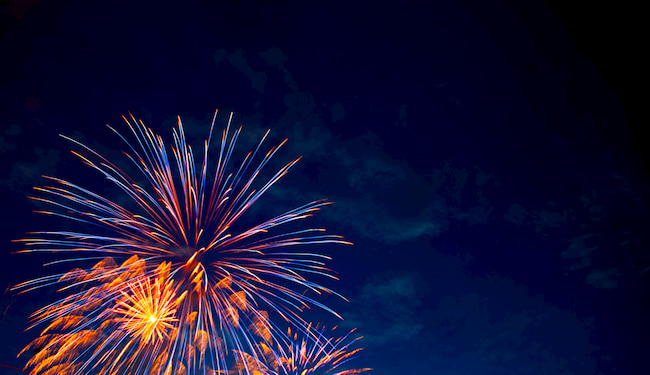Each year millions of fireworks are set off on the Fourth of July and surrounding days. But along with those fireworks comes added danger — the Consumer Product Safety Commission reports that 15,600 people were treated in the ERs for related firework injuries in 2020 and the majority of those occurred in the month around the July 4 holiday.
The best way to keep your family safe is to watch a public firework display. But if you plan to celebrate with fireworks at home, follow these safety guidelines:
Before Fireworks
- Read and follow all package instructions. That seems easy enough, right? But that simple rule of thumb isn’t always followed. Pay particular attention to the instructions about lighting the firework.
- Be certain that the fireworks you purchase come in manufacturer packaging. If they don’t, they may have come from a larger package designed for professional displays, which are unsafe for at-home use.
- Choose an open, level outdoor area away from people, homes, and dry grass and trees.
During Fireworks
- Adult supervision is required.
- Only adults should light fireworks. Even sparklers burn at temperatures around 2,000 degrees, which is hot enough to melt some metals, and they can quickly ignite clothing.
- Never give a child younger than 6 years of age a sparkler. Children under age 12 should be closely supervised. Safe Kids Worldwide recommends handing out colorful glow sticks.
- Children, even older ones, should not be allowed to play with fireworks, whether they’re lit or not.
- Keep a bucket of water or a hose nearby and soak or submerge any that don’t go off or that malfunction.
- Don‘t stand directly over a firework when lighting it.
- Light only one firework at a time and move away quickly.
- Wear eye protection.
- Never try to re-light or handle fireworks that have not ignited fully.
After Fireworks
The Chattanooga Fire Department recommends these steps for proper disposal of used fireworks.
- Soak. Completely submerge fireworks in a bucket of water. Allow to soak overnight.
- Wrap. Double wrap soaked fireworks in plastic wrap or plastic bags so they do not dry out.
- Dispose. Place wrapped bags in regular household garbage and take to your local solid waste facility
A few more safety reminders:
- Remember that fireworks are not toys.
- Don’t point or throw fireworks at someone else.
- Don’t carry fireworks in your pocket.
- Don’t shoot off fireworks indoors or near/toward buildings.
- Don’t light fireworks near dry grass.
- Don’t shoot off fireworks in a metal or glass container.
- Don’t experiment with creating or lighting homemade fireworks.
In case of an Injury:
- Eye Injuries. Don’t touch, rinse, rub or apply ointments to eyes. Do not remove any objects that are stuck in eyes. Protect injured eye and seek medical attention immediately.
- Burns. Remove clothing from skin, run cool water over burn, and cover with a non-adhesive clean dressing. Seek medical attention.
Lindsay Bass, BSN, RN, is the Pediatric Trauma Injury Prevention & Outreach Coordinator at Children’s Hospital at Erlanger. She is a Child Passenger Safety Technician and leads the Southeast Coalition for Safe Kids and Children’s Hospital at Erlanger Safe & Sound program.
Erlanger Health System is the region’s only Level I Trauma Center, and staffs seven Emergency Departments that serve children and adults in the East Tennessee and Western North Carolina region. If you suffer a fireworks-related emergency, call 911.






